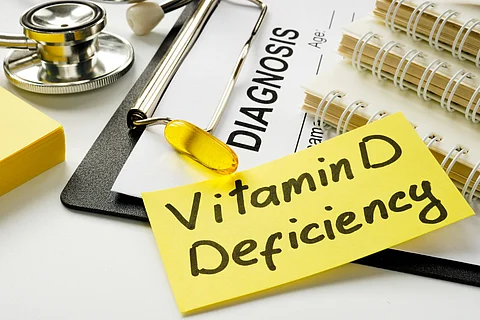

A report by the Indian Council for Research on International Economic Relations (ICRIER) has sounded the alarm over a worsening public health crisis in India: Vitamin D deficiency. With one in five Indians affected, the think tank has called for a national campaign, pricing reforms, food fortification and better diagnostics to tackle what it describes as a “silent epidemic”.
According to the report titled Roadmap to Address Vitamin D Deficiency in India, the deficiency affects all age groups and professions, from children and outdoor workers to healthcare personnel. Among children aged 0-10, 46 per cent suffered from rickets, while 80-90 per cent of the elderly were at risk of osteoporosis, raising the likelihood of fractures and long-term disability.
The deficiency was most severe in eastern India, where nearly 39 per cent of the population lacked sufficient levels. Urban lifestyles, high air pollution, indoor work culture and social norms discouraging sun exposure were cited as key factors reducing natural Vitamin D synthesis. Diet compounded the issue, with low consumption of Vitamin D-rich foods like fish, eggs and dairy, especially among vegetarians and the lactose intolerant.
ICRIER also noted that Indian women were more vulnerable to the deficiency across all age groups.
Health experts warned that Vitamin D plays a vital role beyond bone health, reported the newspaper The Mint. Its deficiency was linked to fatigue, muscle weakness, depression and an increased risk of cardiovascular diseases, type 2 diabetes and cancers such as breast and prostate cancer.
Private diagnostic labs charged over Rs 1,500 for a Vitamin D test, while even supplements ranged from Rs 48 to Rs 130 for just ten tablets. Although cholecalciferol is listed under essential medicines, only its animal-based variant is regulated by the National Pharmaceutical Pricing Authority (NPPA), leaving the plant-based alternative unregulated and expensive, The Mint report added.
The ICRIER report urged the government to:
Reduce GST on Vitamin D supplements.
Cut import duty on testing kits and supplements from 10 per cent to 5 per cent.
Bring both D2 (plant-based) and D3 (animal-based) formulations under price regulation.
Promote domestic research and development for low-cost testing solutions.
Expand food fortification beyond milk and oil to staples like wheat and rice.
It also proposed integrating Vitamin D testing into existing health schemes like Anaemia Mukt Bharat and improving mid-day meals under PM POSHAN by including fortified items like eggs and milk.
“Vitamin D deficiency is a public health issue that can severely impact national productivity and strain the healthcare system if left unaddressed,” said Aashish Chaudhry, co-author of the study and managing director of Aakash Healthcare told The Times of India.
ICRIER called for a nationwide “Vitamin D Kuposhan Mukt Bharat” campaign using schools, media and community outreach to raise awareness, especially among children, pregnant women and the elderly.